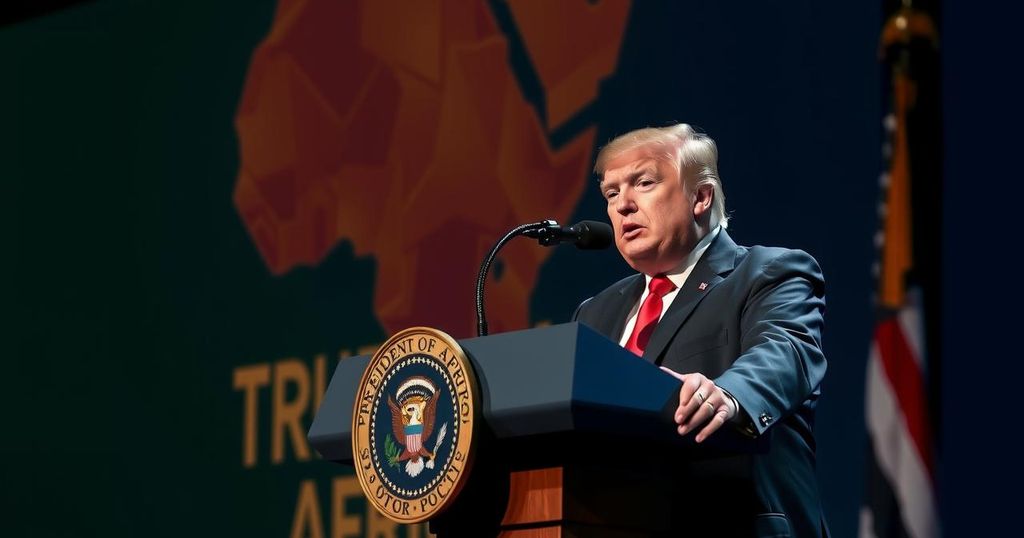Former US President Donald Trump’s potential return to office presents both risks and opportunities for Africa. His focus on transactional politics over traditional diplomacy may intensify existing regional conflicts and undermine multilateral peace initiatives established by previous administrations. As the dynamics in regions like Sudan and Ethiopia become increasingly affected by external influences, African leadership will need to adapt to a foreign policy landscape characterized by deals rather than principles.
The recent political landscape surrounding the potential second term of US President Donald Trump presents both opportunities and challenges for Africa. Known for his transactional approach to diplomacy, Trump is unlikely to embrace the collaborative, principle-based initiatives that characterized the Obama administration’s engagement with the continent. This pivot away from robust diplomatic efforts may further complicate Africa’s complex layers of conflict, particularly in regions like Sudan and Ethiopia, where external influences from Middle Eastern nations exacerbate crises. Moreover, the shift in US foreign policy could embolden autocratic leaders while sidelining the principles of human rights and multilateral cooperation that have historically guided American relations with Africa. The likely continuation of the so-called “Trump Doctrine” positions controversial partnerships over principled negotiations, significantly altering the trajectory of African geopolitics. Furthermore, the dynamics in the Horn of Africa reflect the need for decisive action amidst ongoing tensions; however, Trump’s presidency may prioritise strategic alliances over the implementation of comprehensive peace frameworks. Observing Sudan’s prolonged conflict and the potential for geopolitical recalibration within the region only substantiates the necessity for an informed and engaged policymaking strategy. This confluence of transactional politics and Africa’s diverse challenges underscores a turbulent future, particularly at a time when the continent is grappling with significant humanitarian crises. As African leaders gather to navigate their political landscape, they face critical decisions regarding partnerships and the sustainability of peace initiatives. The implications of Trump’s leadership style will markedly shape not only the immediate responses to Africa’s pressing issues but also the broader engagement and cooperation that is paramount for long-term stability. Political ramifications extend beyond individual nations; as alliances are tested and redefined, the potential for destabilization grows. Therefore, Africa must prepare to adapt to a foreign policy shaped by negotiation tactics that primarily focus on trade-offs, often at the expense of democratic values and regional coherence. The evolving narrative emphasizes the paramount importance of strategic foresight within African governance as it intersects with American political objectives.
In the context of international relations, Africa’s historical engagement with the United States has been defined by a largely liberal approach focused on multilateral cooperation and principles of democracy and human rights. This approach was notably prominent during the Obama administration, which worked to solidify partnerships with the African Union and enhance UN peacekeeping efforts. However, the transition to Trump’s presidency marked a strategic pivot towards transactional diplomacy, as seen through his administration’s interactions with leaders in the Middle East and Africa. The implications of this transactional approach present a varied landscape where traditional diplomatic norms are challenged, raising critical questions about the future trajectory of peace and security in Africa. Especially as developments in countries like Sudan and Ethiopia unfold, understanding these shifts in US foreign policy is essential for African leaders and citizens. As they face the prospect of another Trump-led administration, their strategies will need to adapt to potentially volatile foreign relations rooted in self-interest.
In summary, the potential return of Donald Trump to the presidency poses significant implications for African nations both politically and economically. His preference for transactional dealings rather than collaborative diplomacy threatens to undermine the progress achieved under prior administrations. As conflicts persist in regions such as Sudan and Ethiopia, coupled with the geopolitical interests of Middle Eastern powers, Africa stands at a crossroads. The continent must navigate an increasingly complex political landscape that favors deals over principles, illustrating the urgent need for strengthened regional cooperation and proactive leadership to address these multifaceted challenges effectively.
Original Source: www.bbc.com







